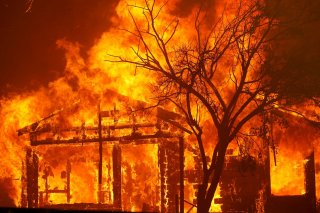Doctors Warn Wildfire Smoke Can Worsen Coronavirus Symptoms—With or Without Masks
The wildfires in California are no joke.
Fires burning across California and Colorado have come at a terrible time for individuals who are suffering from coronavirus symptoms, as the dangerous smoke can lead to increased emergency room visits or worse.
For those who are looking for added protection by wearing cotton masks, the Centers for Disease Control and Prevention has come out and said that they do little to keep out the smoke, which can spread for hundreds of miles and contain a mix of gases and tiny particles that come from the burning trees, plant material, and potentially toxic materials.
Wildfire smoke is known to sting eyes and irritate the throat and lungs, resulting in coughing, wheezing, and even asthma attacks or bronchitis. Associated symptoms can include chest pain, a rapid heartbeat, headaches, a runny nose, and fatigue.
The smoke particles, which are twenty to thirty times smaller than the diameter of a hair follicle, are highly proficient in penetrating the tiniest of spaces.
“Masks that are used to slow the spread of COVID-19 offer little protection against wildfire smoke. They do not catch small, harmful particles in smoke that can harm your health,” the CDC said in its updated guidance.
“Although N95 respirators do provide protection from wildfire smoke, they might be in short supply as frontline healthcare workers use them during the pandemic.”
According to Dr. Stephanie Christenson, a University of California San Francisco assistant professor of medicine, smoke particles can often take direct aim at the vulnerable lungs.
They “can get in and lodge deeply in the lungs and cause inflammation,” she said during a briefing sponsored by UCSF.
“And that is also what we were worried about in COVID-19, whereas people get more severe disease, the inflammation in their lungs can overwhelm the system, and potentially cause really severe issues.”
The CDC added that individuals at heightened risk include the elderly, pregnant women and people with chronic respiratory and heart conditions.
Children can also be at higher risk because they breathe more air per pound of body weight than adults, not to mention that smoke can irritate their still-developing lungs.
The agency noted that the best way to protect yourself from the harmful smoke is to reduce your exposure immediately by heading into a shelter or spaces that have clean air.
Cleaner air shelters, such as school gymnasiums, buildings at public fairgrounds, and civic auditoriums, are used by many communities to provide spaces where people can shelter overnight or for extended periods of time.
The CDC also advised to limit outdoor exercise or choose lower-intensity activities.
According to the latest data from Johns Hopkins University, there are more than 22.7 million confirmed cases of coronavirus worldwide, including at least 794,000 deaths.
Ethen Kim Lieser is a Minneapolis-based Science and Tech Editor who has held posts at Google, The Korea Herald, Lincoln Journal Star, AsianWeek and Arirang TV. Follow or contact him on LinkedIn.
Image: Reuters

